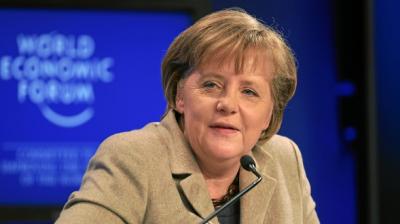
Among analysts, there is no consensus regarding Germany’s position in the EU. One often reads about the country’s lack of ambition to solve the eurocrisis. In this view, Germany is considered an under-achiever. According to a recent special report of The Economist, Germans consider themselves as a larger Swiss: economically successful, but politically modest. Its small country mentality and its absence of strategic thinking leads to indecisiveness, and to a new power vacuum at the heart of Europe.
What makes a modern hegemon?
There is also a different story. Germany is often depicted as the new hegemon of Europe. Indeed, the country has become a Very Important Player in the international arena, in the Eurozone, in the EU, and in other parts of the world. Like no other, Germany has been able to adapt itself to the uncertain international affairs after the fall of the wall. The traditional German policy of exercising its power within the international organizations, instead of going alone, appeared to be effective. Particularly after the credit crunch, Germany moved central stage within the Eurozone.
Yet, one may ask whether the concept of hegemony is well chosen to describe Germany’s position. A hegemon is considered to take its responsibility for other countries. In the EU, this is anyway difficult, since it is illegal for member states to assume the commitments or debts of any other. Supporting other member states is only possible via ‘side paths’, such as the European Stability Mechanism.
Another reason why the concept of German hegemony is problematic is that the country’s favourable position in the international arena could be temporary. At the turn of the century, when Germany encountered great difficulties to overcome its structural economic problems, its position was not flourishing at all. Germany was considered the sick man of Europe. And in 2003, the EU was divided over Iraq. Germany and France were not able to convince the Coalition of the Willing to reject the American invasion.
Only after the Hartz IV reforms of the labour market and the relative success of the German economy, the concept of German hegemony popped up in the newspapers. With the help of the European Commission, Germany is able to export its reform policy to other countries. Among the European leaders, Ms Merkel is one of the longest serving incumbent heads of government. With her experience, and with a strong position of the European People’s Party in the European Council (49,72%), she is able to operate effectively. When these favourable conditions change, Germany’s position in the EU could soon become precarious.
Germany overestimated
One may ask, whether Germany isn’t ascribed too much power nowadays. Germany is not in the position to project its will on other countries. This can be illustrated easily by two cases of strong Dutch influence in the EU. When the Greek government debt crisis broke out, Germany hesitated to act. In February 2010, the Dutch prime minister Jan-Peter Balkenende proposed to call in the IMF, but his proposal didn’t receive support in the European Council. However, due to a strong Dutch lobby, Merkel revised her opinion on IMF involvement. In April, the initial Dutch proposal was accepted by the European Council and the first rescue package, consisting of a loan by the European Union, the European Central Bank and the IMF, was accepted in May 2010.
A similar turn of the German position in favour of the Dutch was the acceptance of a strong European Commissioner for budget discipline. Traditionally, Germany wants a strong European Court of Justice which guarantees the EU stability mechanisms. Since the credit crunch, Merkel is not in favour of more power to the Commission. But after a visit of Dutch prime minister Mark Rutte in October 2011, she called the Dutch proposal for a special commissioner for budget discipline an interesting idea. Even though the strong tandem of Merkozy gave the impression of an unbreakable French German axis, these two examples show that the Dutch government was able to intervene.
After the change of government in France, the limits of the French German axis disclosed soon. Initially, Herman van Rompuy’s Master Plan was surely not unwelcome to the French German tandem called Merkozy. But with François Hollande in the Elysée Palace, only the Banking Union survived. Not until May 2013, Ms Merkel and Mr Hollande exchanged views and came to an agreement, in which a combination of budget discipline, contractual arrangements for competiveness and growth, solidarity mechanisms and an institutional consolidation of the Eurogroup are intended. And after David Cameron’s critical lecture on the EU, Germany supported various British standpoints, for example by agreeing to reduce the spending of the EU-budget by three percent in the coming years and by supporting the talks to negotiate a free trade agreement between the EU and the US, despite French reservations. Also, the relations with the Netherlands have been improved, particularly after Geert Wilders’ withdrawal of his support of the Rutte-Verhagen cabinet.
Like all member states, also Germany navigates tactically within the EU-arena. After E.P Wellenstein and Luuk van Middelaar, this arena could be described as a convoy of ships, which sometimes is driven apart by a strong wind, and sometimes sails in the same direction. There is not one captain, but many. And it remains difficult to see how the ships are linked underwater.
Germany as a purely economic hegemon?
In the distribution of votes within the European Council, Germany has the same share as France, the United Kingdom, and Italy. When it comes to voting, Merkel’s vote weighs as heavy as Hollande’s, Cameron’s, or even Letta’s vote. In the European Central Bank, each central banker has one vote. Only within the European Parliament, Germany has more representatives than other member states: 99 MEP’s, 17 more than France, Great Britain, or Italy. But these figures do not reveal the real power relations.
Power is also a matter of perception. In the perception of politicians and analysts, Germany’s power grew rapidly. At the beginning of the European sovereign debt crisis, Germany was accused of acting too little, too late. Many analysts warned for a weak Germany within the EU. After a while, Germany’s reserved EU policy came to be seen as a sign of strength.
Here, I would like to make three remarks, which put this perception of German power into perspective. Firstly, both the Greek debt crisis and the Cyprus banking crisis illustrated the limits of German power. Only after many debates and a strong lobby of the countries in need of help, other EU-member states brought Germany in a position of decision maker, since they waited for Ms Merkel and Mr Schäuble, not only to make up their mind, but also to bring the bad news. But bringing the bad news is not the same as having the power to decide.
A second point is that the idea of German hegemony is often related to the austerity agenda of the EU. However, one may ask, whether this is a typical German agenda. When the French Parti Socialiste discussed the necessity of limiting the French government’s budget deficit to three percent it was presented as a debate for or against a German dictate. This is misleading. Rather, it is a typical divisive within the French socialist party itself which dates back to the first years of the Mitterrand government. The key question for the French, and also for other European social democratic parties, is: Should we defend the achievements of the social welfare state, or better take refuge in a European model, which includes a flexible labour market, a higher age of retirement, and lower taxes? When speaking of the three percent budget deficit, I would rather call it a liberal conservative hegemonic discourse within the EU than German hegemony.
The last point I would like to make is that German power within the EU grew sharply under Merkel’s government, since she has been able to make her own policy goals to a large extend congruent with the goals of the EU. Although Schröder’s renewed self-confidence was not always in line with Brussels, today, his Hartz 4 reforms have become the basis of a European reform agenda. Germany is able to carry through its EU-policy on various levels and in various ways very effectively. Not that Merkel can push through anything she wants, on the contrary, but thanks to her experience and her extensive knowledge of the files discussed, she is able to act effectively in such a way that most decisions in the EU at least seem to bear Germany’s stamp.
Exporting domestic politics
As no other, Merkel realizes that the European Union has become part of our domestic policy. The German agenda of ordoliberalism, of a free market guided by rules set by the government, is transposed easily to the EU level. Better than other member states, Germany has been able to export institutional solutions and to create an arena of multilateral cooperation in which its own interests could flourish well.
The German sense of compatibility of domestic and European policy, realistic or not, is of great importance. For many politicians, the values of the German social market economy are the leading principles in Europe. This explains the absence of a strong anti-EU party in the German parliament, despite the relatively strong euroscepticism among the German people. Unlike voters of other older member states like Italy, France, The Netherlands and Great Britain, the German voter recognizes many elements of domestic policy in Brussels, including its negotiating culture and its many checks and balances.






